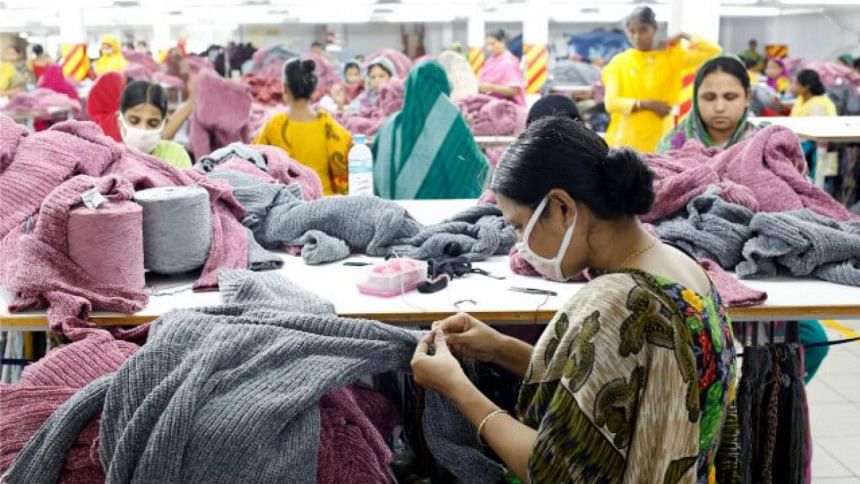Thinking out of the box to gain some bargaining power

We constantly hear the complaint from our apparel exporters that buyers do not pay them a fair price for their products. Whether or not this is a fair assessment is perhaps irrelevant. Apparel supplier factories everywhere in the world are operating in a hugely competitive market where buyers hold all the cards. If one supplier does not offer them the right price, they can be confident that another one will.
Consider, for instance, that in Bangladesh there are more than 4,000 ready-made garment factories. Apparel brands and retailers have a huge number of factories vying for their custom—so who can blame them for driving a hard bargain on price? Will this situation ever change? It is hard to believe that it will. After Rana Plaza when global apparel brands and retailers were under intense scrutiny, there is evidence to show they still continued to drive suppliers down on FOB prices. This is despite the fact that RMG factories were required to invest massively in factory upgrades to meet the requirements of the Accord and Alliance.
Given the above situation, it is time for apparel factories to think outside the box. For instance, what if there was another way for supplier factories to take back some power? What if RMG factories could sell their products directly to consumers using smart digitisation technology and through creation of their own brands?
Such a strategy brings many potential benefits—better margins, faster way to reach market, and less waste are three of the most obvious advantages.
A business-to-consumer (B2C) model which saw apparel factories supplying directly to consumers could complete the picture, offering "see now", "buy now", "make now" opportunities. This would see end-consumers ordering branded products directly from the websites of apparel factories and, where appropriate, adding their own customisation to their product, whether that be to a pair of jeans or a T-shirt.
A direct, seamless operation covering order processing and production through to logistics and delivery could see customised products being delivered directly to the end-consumer, with no involvement from apparel brands or retailers.
At the same time, there are now a number of software-technology companies which are creating tools to support the rapid transition from design to manufacturing. For example, a customised design on a website can be transmitted directly to a knitting or printing machine to create a bespoke product.
This whole area is changing fast and offers huge opportunities for traditional apparel suppliers. However, to take this step, they will need to invest in new technology as well as in branding and marketing. Dealing directly with end-consumers is a completely different way of doing business, and this is a business model that RMG factories may have to evolve slowly towards alongside their traditional operations.
Branding and marketing are critical tools here. RMG factories in Bangladesh are experts at dealing with business customers—apparel brands and retailers. But many lack knowledge and understanding of the slick marketing and branding techniques which are required to deal with end-consumers.
This requires a whole new set of skills and may need RMG factory owners to make investment in public relations and marketing. In addition, it is important to design a differentiation model which allows you to stand out from the international competitors where you offer innovation in terms of storytelling, products or technology. The value addition needs to be unique. If not, you will end up competing on price, meaning you will have created two problems for yourself—still challenged in your core B2B manufacturing business, but also fallen into the same trap in your growth B2C opportunity, instead of a solution. Creating a brand from scratch takes time, effort and resources. This is a creative process but, done properly, it can be hugely rewarding and may potentially offer an important point of diversification for factory owners. As mentioned earlier, such an approach also offers a potential direct link with end-consumers.
The ultimate objective here is for the customers to pull production through a speedy and responsive supply chain, rather than the current system of making large volumes of product that eventually require pushing onto customers through discounting.
As well as offering opportunities for supplier factories in Bangladesh, a shift towards selling directly to consumers also provides potential sustainability benefits.
Waste is a major issue at present in the global apparel supply chain. Current estimates indicate that between a third and half of all clothing is now discounted. Direct manufacturer-to-consumer production can also potentially lead to sustainable consumption and better margins
The trend to greater customisation of apparel has been much publicised in the last few years, and offers the potential for increased margin, if the manufacturing challenges can be overcome.
From a sustainability perspective, the greater involvement of the consumer in the design and making process may create greater attachment, and hence increase the effective lifetime of an end garment. For example, a pair of jeans with greater personal meaning is likely to be kept and used more than one without. This may help to increase the overall utilisation of clothing which numerous studies have shown to be in steady decline.
Without a doubt, apparel brands and retailers are in a powerful negotiating position with the RMG factories. Complaining will not change that picture. Instead, now could be the perfect time to use new technology to cut out the middleman and sell their products directly to end-consumers.
Mostafiz Uddin is the Managing Director of Denim Expert Limited. He is also the Founder and CEO of Bangladesh Denim Expo and Bangladesh Apparel Exchange (BAE). He can be reached at [email protected].








Comments